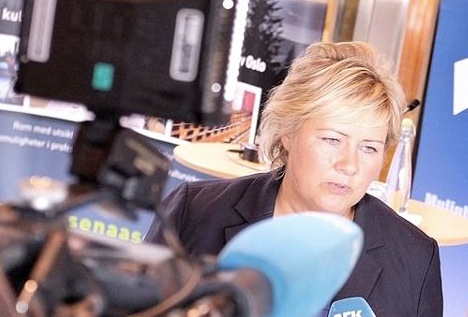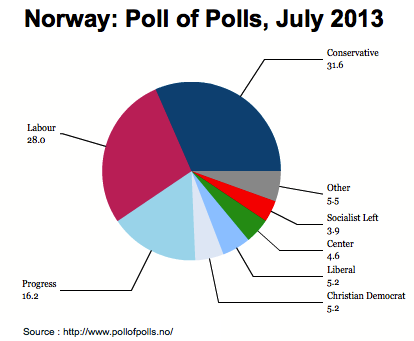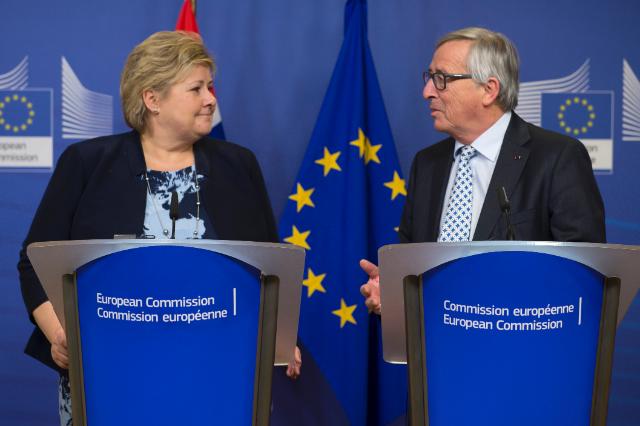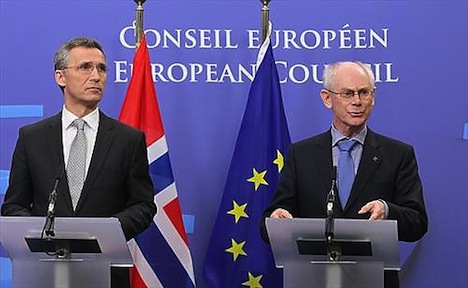
Norway kicks off a busy month of elections in Europe with parliamentary elections on September 9, and if the past year’s worth of polls are to be trusted, Norwegians seem set to take a right turn, despite one of the best economies in Europe. 
If they do so, Norway is likely to have only the second female prime minister in its history — Erna Solberg, who since 2004 has been the leader of the Høyre (literally the ‘Right,’ or more commonly, the Conservative Party).
With less than two months to go, Solberg’s Conservatives have built a growing and steady lead over the governing Arbeiderpartiet (Labour Party) and prime minister Jens Stoltenberg, a popular prime minister who’s governed Norway since 2005.
A familiar face as the Conservative leader for nearly a decade, Solberg served previously as a minister of local government and regional development from 2001 to 2005 in Norway’s previous center-right government, a role that earned her the nickname of ‘Jern-Erna,’ or ‘Iron Erna,’ and she bears some similarity to the other, more familiar center-right leader who’s running for reelection in September as well (catch an English interview with Solberg from April on the U.S.-based CNBC here).
Winning a third consecutive term in office is difficult for any government because, as years go by, the front line of policymakers either leave government or become increasingly fatigued, and governing parties, who have an increasing political stake in the status quo, don’t often regenerate the same quality of new ideas that outside parties do while in opposition.
But it’s hard to understand just why Labour seems so likely headed out of government, especially in light of Stoltenberg’s continued popularity. It’s even more baffling when you consider that Norway is one of the best governed states in Europe, let alone the world. Despite the fact that most of Europe is in recession or zero-growth mode, Norway grew by an estimated 3% in 2012, and the unemployment rate is a laughably low 3.5%. Thanks to its oil wealth, it has had balanced budgets for nearly two decades, the government routinely banks its surplus (an estimated 15% of GDP in 2012) in investment funds for future use, and Norway’s GDP per capita now exceeds $60,000.
That leads to two questions: why are Norwegian voters so adamant about voting out its current government? And how did Solberg and the Conservatives become such clear frontrunners?
Background: politics in the Stoltenberg era
The 2005 election (and the ensuing 2009 election) brought about the balance that’s largely held steady for the past eight years. Stoltenberg currently governs with the support of a ‘Red-Green’ coalition dominated by Labour and its two smaller allies, the democratic socialist Sosialistisk Venstreparti (Socialist Left Party) and the Senterpartiet (Centre Party), a chiefly agrarian party that’s moved from the political right to the political left in recent years. Note that ‘green’ in Norway’s Red-Green coalition indicates the Center Party’s roots in rural life, not its environmental activism.
The 2005 fall of the previous center-right government of prime minster Kjell Magne Bondevik brought a drop in support for both Kristelig Folkeparti (Christian Democratic Party) and his coalition partners, the Conservatives. That left the Framskrittspartiet (Progress Party), a relatively populist party known chiefly for its opposition to much of the Norwegian social welfare state, its advocacy of lower taxes, smaller government and deregulation, and its controversial anti-immigration stance, as the second-largest party in Norway’s parliament. Unlike Labour and the Conservatives, both of which were founded in the late 19th century, the Progress Party emerged only in the 1970s as a modern conservative anti-tax movement. Though it’s grown to become a major force in Norwegian politics over the 1990s and 20o0s, Progress has never formally joined any government, though that seems likely to change, as Solberg is expected to bring Progress into government if her party maintains its polling lead on September 9.
Though if Solberg’s Conservatives win their expected landslide, they will do so in large part by consolidating left-leaning moderates that have supported Labour and right-leaning moderates that have supported Progress.
The latest July 2013 poll-of-polls shows the Conservatives with nearly 32% of the vote, which would give them around 58 seats in the Storting, Norway’s unicameral 169-seat parliament:

That’s a huge jump from the 30 seats the Conservatives hold now, and it’s a massive jump from their 2005 debacle, when they won just 14.1% of the vote and a measly 23 seats.
Even more striking is that Labour might not win the largest plurality of votes and the largest bloc of seats in parliament — for the first time since 1924. Continue reading How Erna Solberg became the frontrunner in Norway’s upcoming election →

![]()
![]()


